Viernes
Eventos economicos
Habla Charles Plosser
Sentimiento del consumidor
Charles Plosser Speaks
5:30 AM ET
Consumer Sentiment
9:55 AM ET
SIFMA Rec. Early Close 2:00 ET
Viernes 26/05/12 Sentimiento del consumidor
Re: Viernes 26/05/12 Sentimiento del consumidor
9:34 p.m. EDT 05/24/12Futures Last Change Settle
Crude Oil 91.02 0.36 90.66
Gold 1556.4 -1.1 1557.5
E-mini Dow 12530 -6 12536
E-mini S&P 500 1322.25 -0.25 1322.50
9:45 p.m. EDT 05/24/12Currencies Last (mid) Prior Day †
Japanese Yen (USD/JPY) 79.68 79.59
Euro (EUR/USD) 1.2548 1.2533
† Late Thursday in New York.
advertisement
Crude Oil 91.02 0.36 90.66
Gold 1556.4 -1.1 1557.5
E-mini Dow 12530 -6 12536
E-mini S&P 500 1322.25 -0.25 1322.50
9:45 p.m. EDT 05/24/12Currencies Last (mid) Prior Day †
Japanese Yen (USD/JPY) 79.68 79.59
Euro (EUR/USD) 1.2548 1.2533
† Late Thursday in New York.
advertisement
- admin
- Site Admin
- Mensajes: 165559
- Registrado: Mié Abr 21, 2010 9:02 pm
Re: Viernes 26/05/12 Sentimiento del consumidor
Asia-Pacific
Index Name Value Change % Change Time
Nikkei 225 8,578.92 +15.54 +0.18% 21:22:15
Hong Kong Hang Seng Index 18,734.38 +67.98 +0.36% 21:27:00
S&P/ASX 200 4,052.90 -2.95 -0.07% 21:25:01
More Asia-Pacific Indexes
Index Name Value Change % Change Time
Nikkei 225 8,578.92 +15.54 +0.18% 21:22:15
Hong Kong Hang Seng Index 18,734.38 +67.98 +0.36% 21:27:00
S&P/ASX 200 4,052.90 -2.95 -0.07% 21:25:01
More Asia-Pacific Indexes
- admin
- Site Admin
- Mensajes: 165559
- Registrado: Mié Abr 21, 2010 9:02 pm
Re: Viernes 26/05/12 Sentimiento del consumidor
Copper May 24,21:39
Bid/Ask 3.4765 - 3.4775
Change +0.0224 +0.65%
Low/High 3.4538 - 3.4865
Charts
Nickel May 24,21:39
Bid/Ask 7.6899 - 7.7031
Change +0.0038 +0.05%
Low/High 7.6513 - 7.7398
Charts
Aluminum May 24,21:39
Bid/Ask 0.8932 - 0.8941
Change +0.0044 +0.50%
Low/High 0.8887 - 0.8941
Charts
Zinc May 24,21:39
Bid/Ask 0.8497 - 0.8502
Change +0.0023 +0.27%
Low/High 0.8474 - 0.8522
Charts
Lead May 24,21:39
Bid/Ask 0.8775 - 0.8805
Change +0.0012 +0.14%
Low/High 0.8761 - 0.8829
Charts
Bid/Ask 3.4765 - 3.4775
Change +0.0224 +0.65%
Low/High 3.4538 - 3.4865
Charts
Nickel May 24,21:39
Bid/Ask 7.6899 - 7.7031
Change +0.0038 +0.05%
Low/High 7.6513 - 7.7398
Charts
Aluminum May 24,21:39
Bid/Ask 0.8932 - 0.8941
Change +0.0044 +0.50%
Low/High 0.8887 - 0.8941
Charts
Zinc May 24,21:39
Bid/Ask 0.8497 - 0.8502
Change +0.0023 +0.27%
Low/High 0.8474 - 0.8522
Charts
Lead May 24,21:39
Bid/Ask 0.8775 - 0.8805
Change +0.0012 +0.14%
Low/High 0.8761 - 0.8829
Charts
- admin
- Site Admin
- Mensajes: 165559
- Registrado: Mié Abr 21, 2010 9:02 pm
Re: Viernes 26/05/12 Sentimiento del consumidor
Los futures del Dow Jones 19 puntos a la baja
Oil up 90.90
Au down 1,555.20
Oil up 90.90
Au down 1,555.20
- admin
- Site Admin
- Mensajes: 165559
- Registrado: Mié Abr 21, 2010 9:02 pm
Re: Viernes 26/05/12 Sentimiento del consumidor
Euro up 1.2542
El Hang Sneg -0.26%, el Nikkei -0.01%, Australia -0.42%, el Shanghai C. -0.11%
Yen down 79.67
Ag down 28.06
El Hang Sneg -0.26%, el Nikkei -0.01%, Australia -0.42%, el Shanghai C. -0.11%
Yen down 79.67
Ag down 28.06
- admin
- Site Admin
- Mensajes: 165559
- Registrado: Mié Abr 21, 2010 9:02 pm
Re: Viernes 26/05/12 Sentimiento del consumidor
Los graficos del dia, 
.

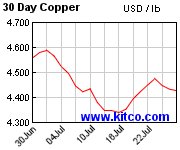
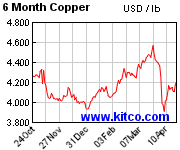
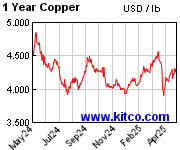
.

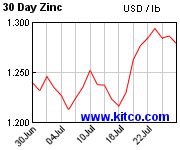
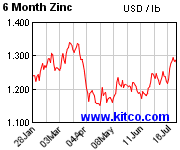
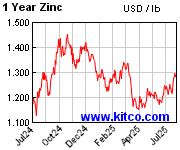
.

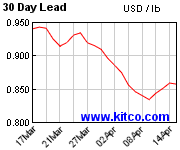
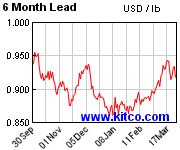
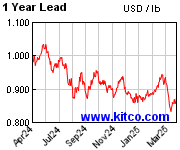
.

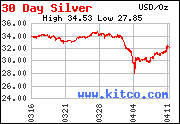
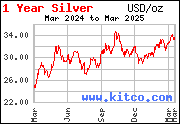
.

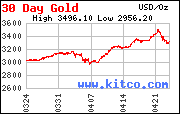
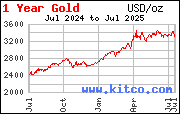
.
.




.




.




.



.



.
- Comodoro
- Mensajes: 980
- Registrado: Jue May 06, 2010 8:24 am
- Ubicación: LIMA
Re: Viernes 26/05/12 Sentimiento del consumidor
11:44 p.m. EDT 05/24/12Treasurys
Price Chg Yield %
2-Year Note 0/32 0.309
10-Year Note 4/32 1.765
* at close
11:35 p.m. EDT 05/24/12Futures
Last Change Settle
Crude Oil 90.48 -0.18 90.66
Gold 1552.9 -4.6 1557.5
E-mini Dow 12499 -37 12536
E-mini S&P 500 1318.00 -4.50 1322.50
11:45 p.m. EDT 05/24/12Currencies
Last (mid) Prior Day †
Japanese Yen (USD/JPY) 79.76 79.59
Euro (EUR/USD) 1.2529 1.2533
† Late Thursday in New York.
Price Chg Yield %
2-Year Note 0/32 0.309
10-Year Note 4/32 1.765
* at close
11:35 p.m. EDT 05/24/12Futures
Last Change Settle
Crude Oil 90.48 -0.18 90.66
Gold 1552.9 -4.6 1557.5
E-mini Dow 12499 -37 12536
E-mini S&P 500 1318.00 -4.50 1322.50
11:45 p.m. EDT 05/24/12Currencies
Last (mid) Prior Day †
Japanese Yen (USD/JPY) 79.76 79.59
Euro (EUR/USD) 1.2529 1.2533
† Late Thursday in New York.
- admin
- Site Admin
- Mensajes: 165559
- Registrado: Mié Abr 21, 2010 9:02 pm
Re: Viernes 26/05/12 Sentimiento del consumidor
8:07 a.m. EDT 05/25/12Treasurys
Price Chg Yield %
2-Year Note 1/32 0.296
10-Year Note 4/32 1.765
* at close
7:58 a.m. EDT 05/25/12Futures
Last Change Settle
Crude Oil 90.95 0.29 90.66
Gold 1563.3 3.5 1559.8
E-mini Dow 12523 -13 12536
E-mini S&P 500 1322.25 -0.25 1322.50
8:08 a.m. EDT 05/25/12Currencies
Last (mid) Prior Day †
Japanese Yen (USD/JPY) 79.54 79.59
Euro (EUR/USD) 1.2557 1.2533
† Late Thursday in New York.
Price Chg Yield %
2-Year Note 1/32 0.296
10-Year Note 4/32 1.765
* at close
7:58 a.m. EDT 05/25/12Futures
Last Change Settle
Crude Oil 90.95 0.29 90.66
Gold 1563.3 3.5 1559.8
E-mini Dow 12523 -13 12536
E-mini S&P 500 1322.25 -0.25 1322.50
8:08 a.m. EDT 05/25/12Currencies
Last (mid) Prior Day †
Japanese Yen (USD/JPY) 79.54 79.59
Euro (EUR/USD) 1.2557 1.2533
† Late Thursday in New York.
- admin
- Site Admin
- Mensajes: 165559
- Registrado: Mié Abr 21, 2010 9:02 pm
Re: Viernes 26/05/12 Sentimiento del consumidor
Copper May 25,07:59
Bid/Ask 3.4850 - 3.4870
Change +0.0309 +0.89%
Low/High 3.4538 - 3.5079
Charts
Nickel May 25,07:59
Bid/Ask 7.7108 - 7.7298
Change +0.0246 +0.32%
Low/High 7.6513 - 7.7489
Charts
Aluminum May 25,07:59
Bid/Ask 0.8923 - 0.8927
Change +0.0035 +0.40%
Low/High 0.8887 - 0.8977
Charts
Zinc May 25,07:59
Bid/Ask 0.8579 - 0.8585
Change +0.0105 +1.24%
Low/High 0.8473 - 0.8601
Charts
Lead May 25,07:58
Bid/Ask 0.8821 - 0.8828
Change +0.0059 +0.67%
Low/High 0.8752 - 0.8838
Charts
Bid/Ask 3.4850 - 3.4870
Change +0.0309 +0.89%
Low/High 3.4538 - 3.5079
Charts
Nickel May 25,07:59
Bid/Ask 7.7108 - 7.7298
Change +0.0246 +0.32%
Low/High 7.6513 - 7.7489
Charts
Aluminum May 25,07:59
Bid/Ask 0.8923 - 0.8927
Change +0.0035 +0.40%
Low/High 0.8887 - 0.8977
Charts
Zinc May 25,07:59
Bid/Ask 0.8579 - 0.8585
Change +0.0105 +1.24%
Low/High 0.8473 - 0.8601
Charts
Lead May 25,07:58
Bid/Ask 0.8821 - 0.8828
Change +0.0059 +0.67%
Low/High 0.8752 - 0.8838
Charts
- admin
- Site Admin
- Mensajes: 165559
- Registrado: Mié Abr 21, 2010 9:02 pm
- admin
- Site Admin
- Mensajes: 165559
- Registrado: Mié Abr 21, 2010 9:02 pm
Re: Viernes 26/05/12 Sentimiento del consumidor
More Americas Indexes
Europe, Middle East & Africa
Index Name Value Change % Change Time
EURO STOXX 50 Price EUR 2,154.03 -2.49 -0.12% 07:50:15
FTSE 100 Index 5,338.83 -11.22 -0.21% 07:49:54
CAC 40 Index 3,035.70 -2.55 -0.08% 07:50:00
Deutsche Borse AG German Stock Index DAX 6,332.99 +17.10 +0.27% 07:49:48
IBEX 35 Index 6,509.10 -25.30 -0.39% 07:50:29
FTSE MIB Index 13,105.77 -2.03 -0.02% 07:50:18
AEX-Index 292.20 +0.12 +0.04% 07:50:15
OMX Stockholm 30 Index 984.78 -1.84 -0.19% 07:50:07
Swiss Market Index 5,869.90 +17.46 +0.30% 07:50:01
More Europe, Middle East & Africa Indexes
Asia-Pacific
Europe, Middle East & Africa
Index Name Value Change % Change Time
EURO STOXX 50 Price EUR 2,154.03 -2.49 -0.12% 07:50:15
FTSE 100 Index 5,338.83 -11.22 -0.21% 07:49:54
CAC 40 Index 3,035.70 -2.55 -0.08% 07:50:00
Deutsche Borse AG German Stock Index DAX 6,332.99 +17.10 +0.27% 07:49:48
IBEX 35 Index 6,509.10 -25.30 -0.39% 07:50:29
FTSE MIB Index 13,105.77 -2.03 -0.02% 07:50:18
AEX-Index 292.20 +0.12 +0.04% 07:50:15
OMX Stockholm 30 Index 984.78 -1.84 -0.19% 07:50:07
Swiss Market Index 5,869.90 +17.46 +0.30% 07:50:01
More Europe, Middle East & Africa Indexes
Asia-Pacific
- admin
- Site Admin
- Mensajes: 165559
- Registrado: Mié Abr 21, 2010 9:02 pm
Re: Viernes 26/05/12 Sentimiento del consumidor
Index Name Value Change % Change Time
Nikkei 225 8,580.39 +17.01 +0.20% 02:28:01
Hong Kong Hang Seng Index 18,713.41 +47.01 +0.25% 04:01:30
S&P/ASX 200 4,029.25 -26.60 -0.66% 02:20:00
More Asia-Pacific Indexes
Nikkei 225 8,580.39 +17.01 +0.20% 02:28:01
Hong Kong Hang Seng Index 18,713.41 +47.01 +0.25% 04:01:30
S&P/ASX 200 4,029.25 -26.60 -0.66% 02:20:00
More Asia-Pacific Indexes
- admin
- Site Admin
- Mensajes: 165559
- Registrado: Mié Abr 21, 2010 9:02 pm
Re: Viernes 26/05/12 Sentimiento del consumidor
Bearish con el cobre
Copper Traders Extend Bearish Streak As Prices Drop: Commodities
By Nicholas Larkin - May 24, 2012 11:55 PM ET
Copper traders are bearish for a second week after mounting concern that slowing growth in China and Europe would curb demand drove prices to a four-month low.
Nine of 18 analysts surveyed by Bloomberg expect the metal to drop next week and three were neutral, the first consecutive negative outlook since April 6. Hedge funds and other money managers cut their wagers on higher prices by 69 percent in the week ended May 15, the most in a month, Commodity Futures Trading Commission data show.
Enlarge image
Copper fell 0.4 percent to $7,573 a metric ton this year on the London Metal Exchange and reached $7,503 on May 23, the lowest since Jan. 10. Photographer: Bartek Sadowski/Bloomberg
Raw materials slid to a five-month low this week and more than $4.3 trillion was erased from the value of global equities this month on concern that Greece will exit the euro as the region’s debt crisis deepens. Manufacturing in the 17-nation euro area slumped to the weakest in almost three years this month and may shrink for a seventh month in China, which accounts for about 40 percent of global copper consumption.
“Copper tends to be a reasonably good signal of what’s going on in the real world,” said Guy Wolf, a strategist at Marex Spectron Group in London. “Europe has become a more immediate concern. Most people in the copper market were already concerned about the outlook in China. We’re looking for prices to find a floor at lower levels in the next couple of months.”
Copper fell 0.2 percent to $7,584.50 a metric ton this year on the London Metal Exchange and reached $7,503 on May 23, the lowest since Jan. 10. The Standard & Poor’s GSCI gauge of 24 commodities slid 4.3 percent this year and the MSCI All-Country World Index (MXWD) of equities rose 0.2 percent. Treasuries returned 1.2 percent, a Bank of America Corp. index shows.
Shortage Narrowing
The metal’s third consecutive annual shortage is narrowing, with demand expected to outpace supply by 158,000 tons this year, compared with 213,000 tons in 2011, according to Barclays Plc. Copper will be in a surplus next year and in 2014, Tiberius Asset Management AG said in a report e-mailed May 18.
While stockpiles monitored by the LME dropped 40 percent this year, some of the metal may be going into bonded warehouses in China that are exempt from a value-added tax and import duties. Inventories in those warehouses are about 600,000 tons, Standard Chartered Plc said in a report April 26. The total including refined and semi-finished metal probably climbed to a record of about 1 million tons, the bank’s analysts said.
China’s refined copper imports slid 21 percent in April from a month earlier, customs data show. Goldman Sachs Group Inc. still expects Chinese demand to drive prices to $9,000 in three months. The bank’s copper consumption indicator, tracking consumer appliance and auto demand in the nation, was at the second-highest level ever last month, the bank’s analysts said in a May 23 report. The gauge will climb about 3 percent this year and about 8 percent next year, they forecast.
Global Expansion
The global economy will expand 3.5 percent this year and 4.1 percent next year, the International Monetary Fund estimates. Chinese Premier Wen Jiabao said over the weekend that the nation will focus more on spurring growth. Germany, Europe’s largest economy, will consider all ideas on bolstering the euro area, Finance Minister Wolfgang Schaeuble said May 21.
Potential production losses may help sustain a supply shortage. BHP Billiton Ltd. and Rio Tinto Group (RIO), the world’s biggest and third-biggest mining companies by sales, said this month they’ll ration capital spending because of costs. Codelco, the largest copper producer, produced 10 percent less metal in the first quarter as ore-grades decreased.
Manufacturing Falls
A gauge of euro-area manufacturing decreased to 45 in May from 45.9 in April, the lowest in 35 months, London-based Markit Economics said yesterday. A 48.7 preliminary reading for a purchasing managers’ index in China released by HSBC Holdings Plc and Markit yesterday compares with 49.3 for April. If confirmed on June 1, it would mark the longest run of below-50 readings since the global recession.
Thirteen of 26 traders and analysts surveyed by Bloomberg said gold would advance next week and three were neutral. Futures on the Comex exchange in New York rose 0.8 percent to $1,554.10 an ounce since the start of January after climbing the previous 11 years.
Six of 11 people surveyed expect raw-sugar prices to decline next week and two were neutral. The commodity slipped 16 percent to 19.58 cents a pound on ICE Futures U.S. in New York this year.
Thirteen of 23 people surveyed anticipate higher corn prices next week, while 11 of 25 said soybeans will advance and six predicted little change. Corn dropped 10 percent to $5.81 a bushel this year as soybeans advanced 14 percent to $13.72 a bushel in Chicago trading.
“All the problems in Europe are starting to have an effect on the real economy,” said Dan Smith, a commodities analyst at Standard Chartered in London. “Countries like China will start to re-accelerate as the government pumps more money into the system. We’re quite optimistic things will turn up in the second half of the year.”
Gold survey results: Bullish: 13 Bearish: 10 Hold: 3
Copper survey results: Bullish: 6 Bearish: 9 Hold: 3
Corn survey results: Bullish: 13 Bearish: 6 Hold: 4
Soybean survey results: Bullish: 11 Bearish: 8 Hold: 6
Raw sugar survey results: Bullish: 3 Bearish: 6 Hold: 2
White sugar survey results: Bullish: 3 Bearish: 5 Hold: 3
White sugar premium results: Widen: 2 Narrow: 4 Neutral: 5
Copper Traders Extend Bearish Streak As Prices Drop: Commodities
By Nicholas Larkin - May 24, 2012 11:55 PM ET
Copper traders are bearish for a second week after mounting concern that slowing growth in China and Europe would curb demand drove prices to a four-month low.
Nine of 18 analysts surveyed by Bloomberg expect the metal to drop next week and three were neutral, the first consecutive negative outlook since April 6. Hedge funds and other money managers cut their wagers on higher prices by 69 percent in the week ended May 15, the most in a month, Commodity Futures Trading Commission data show.
Enlarge image
Copper fell 0.4 percent to $7,573 a metric ton this year on the London Metal Exchange and reached $7,503 on May 23, the lowest since Jan. 10. Photographer: Bartek Sadowski/Bloomberg
Raw materials slid to a five-month low this week and more than $4.3 trillion was erased from the value of global equities this month on concern that Greece will exit the euro as the region’s debt crisis deepens. Manufacturing in the 17-nation euro area slumped to the weakest in almost three years this month and may shrink for a seventh month in China, which accounts for about 40 percent of global copper consumption.
“Copper tends to be a reasonably good signal of what’s going on in the real world,” said Guy Wolf, a strategist at Marex Spectron Group in London. “Europe has become a more immediate concern. Most people in the copper market were already concerned about the outlook in China. We’re looking for prices to find a floor at lower levels in the next couple of months.”
Copper fell 0.2 percent to $7,584.50 a metric ton this year on the London Metal Exchange and reached $7,503 on May 23, the lowest since Jan. 10. The Standard & Poor’s GSCI gauge of 24 commodities slid 4.3 percent this year and the MSCI All-Country World Index (MXWD) of equities rose 0.2 percent. Treasuries returned 1.2 percent, a Bank of America Corp. index shows.
Shortage Narrowing
The metal’s third consecutive annual shortage is narrowing, with demand expected to outpace supply by 158,000 tons this year, compared with 213,000 tons in 2011, according to Barclays Plc. Copper will be in a surplus next year and in 2014, Tiberius Asset Management AG said in a report e-mailed May 18.
While stockpiles monitored by the LME dropped 40 percent this year, some of the metal may be going into bonded warehouses in China that are exempt from a value-added tax and import duties. Inventories in those warehouses are about 600,000 tons, Standard Chartered Plc said in a report April 26. The total including refined and semi-finished metal probably climbed to a record of about 1 million tons, the bank’s analysts said.
China’s refined copper imports slid 21 percent in April from a month earlier, customs data show. Goldman Sachs Group Inc. still expects Chinese demand to drive prices to $9,000 in three months. The bank’s copper consumption indicator, tracking consumer appliance and auto demand in the nation, was at the second-highest level ever last month, the bank’s analysts said in a May 23 report. The gauge will climb about 3 percent this year and about 8 percent next year, they forecast.
Global Expansion
The global economy will expand 3.5 percent this year and 4.1 percent next year, the International Monetary Fund estimates. Chinese Premier Wen Jiabao said over the weekend that the nation will focus more on spurring growth. Germany, Europe’s largest economy, will consider all ideas on bolstering the euro area, Finance Minister Wolfgang Schaeuble said May 21.
Potential production losses may help sustain a supply shortage. BHP Billiton Ltd. and Rio Tinto Group (RIO), the world’s biggest and third-biggest mining companies by sales, said this month they’ll ration capital spending because of costs. Codelco, the largest copper producer, produced 10 percent less metal in the first quarter as ore-grades decreased.
Manufacturing Falls
A gauge of euro-area manufacturing decreased to 45 in May from 45.9 in April, the lowest in 35 months, London-based Markit Economics said yesterday. A 48.7 preliminary reading for a purchasing managers’ index in China released by HSBC Holdings Plc and Markit yesterday compares with 49.3 for April. If confirmed on June 1, it would mark the longest run of below-50 readings since the global recession.
Thirteen of 26 traders and analysts surveyed by Bloomberg said gold would advance next week and three were neutral. Futures on the Comex exchange in New York rose 0.8 percent to $1,554.10 an ounce since the start of January after climbing the previous 11 years.
Six of 11 people surveyed expect raw-sugar prices to decline next week and two were neutral. The commodity slipped 16 percent to 19.58 cents a pound on ICE Futures U.S. in New York this year.
Thirteen of 23 people surveyed anticipate higher corn prices next week, while 11 of 25 said soybeans will advance and six predicted little change. Corn dropped 10 percent to $5.81 a bushel this year as soybeans advanced 14 percent to $13.72 a bushel in Chicago trading.
“All the problems in Europe are starting to have an effect on the real economy,” said Dan Smith, a commodities analyst at Standard Chartered in London. “Countries like China will start to re-accelerate as the government pumps more money into the system. We’re quite optimistic things will turn up in the second half of the year.”
Gold survey results: Bullish: 13 Bearish: 10 Hold: 3
Copper survey results: Bullish: 6 Bearish: 9 Hold: 3
Corn survey results: Bullish: 13 Bearish: 6 Hold: 4
Soybean survey results: Bullish: 11 Bearish: 8 Hold: 6
Raw sugar survey results: Bullish: 3 Bearish: 6 Hold: 2
White sugar survey results: Bullish: 3 Bearish: 5 Hold: 3
White sugar premium results: Widen: 2 Narrow: 4 Neutral: 5
- admin
- Site Admin
- Mensajes: 165559
- Registrado: Mié Abr 21, 2010 9:02 pm
Re: Viernes 26/05/12 Sentimiento del consumidor
Euro down 1.2514
Los futures del Dow Jones 37 puntos a la baja
Europa a la baja
El Asia cerro mixta.
VIX down 21.54
Yields down 1.75%
Oil down 90.54
Au up 1,562
Futures cu 3.44
Los commodities suaves al alza.
-40
Los futures del Dow Jones 37 puntos a la baja
Europa a la baja
El Asia cerro mixta.
VIX down 21.54
Yields down 1.75%
Oil down 90.54
Au up 1,562
Futures cu 3.44
Los commodities suaves al alza.
-40
- admin
- Site Admin
- Mensajes: 165559
- Registrado: Mié Abr 21, 2010 9:02 pm
¿Quién está conectado?
Usuarios navegando por este Foro: No hay usuarios registrados visitando el Foro y 23 invitados
